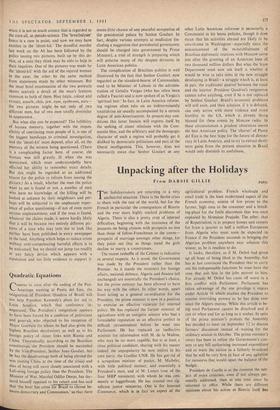Quadratic Equations
COMING so soon after the ending of the Pan- American meeting at Punta del Este, the resignation of President Quadros of Brazil will not help President Kennedy's plans for aid to Latin America, which that conference in The President's resignation appears to have been forced by a coalition of politicians and generals who objected to his reception of Major Guevara (to whom he had also given the highest Brazilian decoration), as well as to his foreign policy of closer links with Russia and China. Theoretically, according to the Brazilian constitution. the President should be succeeded by the Vice-President, Senhor Joao Goulart, but In: has the disadvantage both of being abroad (he was visiting China at the time of the crisis) and also of being still more closely associated with a Left-wing foreign policy than the President. The Minister of War, Marshal Odilio Denys, has dec- lared himself opposed to his return and has said that 'the hour has comeirriali toCROOse be- tween democracy and Communism,' so that there seems little chance of any peaceful occupation of the presidential palace by Senhor Goulart. In fact, despite various attempts at mediation (in- cluding a suggestion that presidential government should be changed into government by Prime Minister), a trial of strength is preparing which will polarise many of the deepest divisions in Latin American politics.
The complication of Brazilian politics is well illustrated by the fact that Senhor Goulart, now regarded as the standard-bearer of Communism, used to be Minister of Labour in the adminis- tration of Getulio Vargas (who has often been called,a Fascist) and is now spoken of as Vargas's `spiritual heir.' In fact, in Latin America reform- ing regimes often take on an indeterminately totalitarian air usually accompanied by a certain degree of anti-Americanism. In present-day con- ditions this latter feature will express itself by the seeking of closer relations with the Com- munist bloc, and the arbitrary and the demagogic character of such a regime will probably get it disliked by democratic politicians and part of the liberal intelligentsia. This, however, does not necessarily mean that Senhor Goulart or any other Latin American reformer is necessarily a Communist in his home policies, though it does mean that his activities abroad are likely to be unwelcome in Washington—especially since the announcement of the re-establishment of Brazilian diplomatic relations with Moscow came just after the granting of an American loan of two thousand million dollars. But what the State Department must now ask itself is whether it would be wise to take sides in the new struggle developing in Brazil—a struggle Ns hich is, at least in part, the traditional quarrel between the coast and the interior. President Quadros's resignation cannot solve anything, even if he is not replaced by Senhor Goulart. Brazil's economic problems will still exist, and their solution, if it is delayed, can only arrive with more violence and more hostility to the US, which is already being blamed for these events by Moscow radio In these circumstances a prudent abstention seems the best American policy. The 'charter' of Punta del Este is the best hope for the future of democ- racy in Latin America. and to try to extract short- term gains from the present situation in Brazil would only diminish its usefulness.


































 Previous page
Previous page